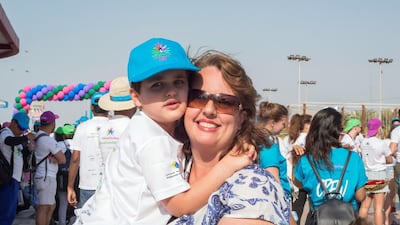More than 1,500 UAE residents stepped out in support of people battling rare diseases at a major event in Dubai.
Proud parents, family members and well-wishers took part in a walkathon at Dubai's Kite Beach on Saturday in a show of solidarity replicated all over the world.
They were joined by Sheikh Nahyan bin Mubarak, Minister of Tolerance at one of 103 international events held to mark Rare Disease Day, which falls on the last day of February each year.
More than 300 million people worldwide are affected by one of 6,000 rare diseases.
A rare disease is one that affects fewer than 1 in 2,000 people, the majority of whom are young children.
The Dubai gathering was organised by the non-profit organisation, High Hopes Pediatrics Therapy Centre.

The organising committee of High Hopes includes three mothers with children that have rare diseases.
“We wanted to advocate for inclusion and tolerance,” said Lynn Barghout Jafar, the founding mum of the group.
She has a five-year-old daughter with a rare genetic condition called CDKL5 deficiency disorder and said she only knows four to five families in the region who have members with that specific condition.
CDKL5 deficiency disorder is where a person has neurodevelopment impairment caused by gene mutation.
“We joined the movement that happens around the world this time each year. In the first walk that took place in 2018, we had around 400 people. It’s really grown in momentum. We really feel the UAE is the most inclusive place to be,” Ms Jafar said.
Catherine Paul-Fijten, another High Hopes committee member, has a five-year-old daughter with an extremely rare disorder, called ZC4H2 Deficiency, in which a person's body is missing a key protein that enables communication between the muscles and the brain, causing chronic health issues.
“We were in a very dark place when we found out and especially because there’s almost no one who has that condition,” Ms Paul-Fijten said.
“We are stronger as a community and we need to share knowledge with each other, which is why events as such are so important.”
At present there is no data that shows the total number of people with rare diseases in the UAE or the region.
Lindsay Mawdsley, a senior occupational therapist and clinical coordinator at High Hopes, said such data could further boost awareness.
“I think it’s (data) going to be useful as it’ll create more awareness, especially with the inclusion policies that have started at schools. It’ll help teachers and the general public understand that rare diseases do happen. If we become more aware and accepting, it’s going to be very helpful,” she said.
Another participant at the event was Emily Ray, the mother of a son with a rare genetic disorder, called angelman syndrome.

The Burj Khalifa lit up on February 15 to mark the International Angelman Syndrome Day. The move was inspired by a social media campaign Ms Ray led to raise awareness of her son's, Sam Ray-Elkhodry, condition.
“Raising awareness is so important. We’ve had lots of people reaching out to us since the campaigning and the Burj Khalifa lighting up. It helps people feel that they are not alone,” she said.
Sheikh Nahyan thanked the impressive crowd for supporting the cause.
“In coming together on this Rare Disease Day, we are faced with a crucial realisation that rare diseases can happen to anyone, at any stage in life,” he said.
“On national and global scales, these diseases are rare but the number of people afflicted by them is very large. Further, the societal impact of those affected is even greater, with whole families and often communities, presented with a daily, often despairing battle with an uncertain future. The cumulative cost of rare diseases is substantial to all of humanity.”


